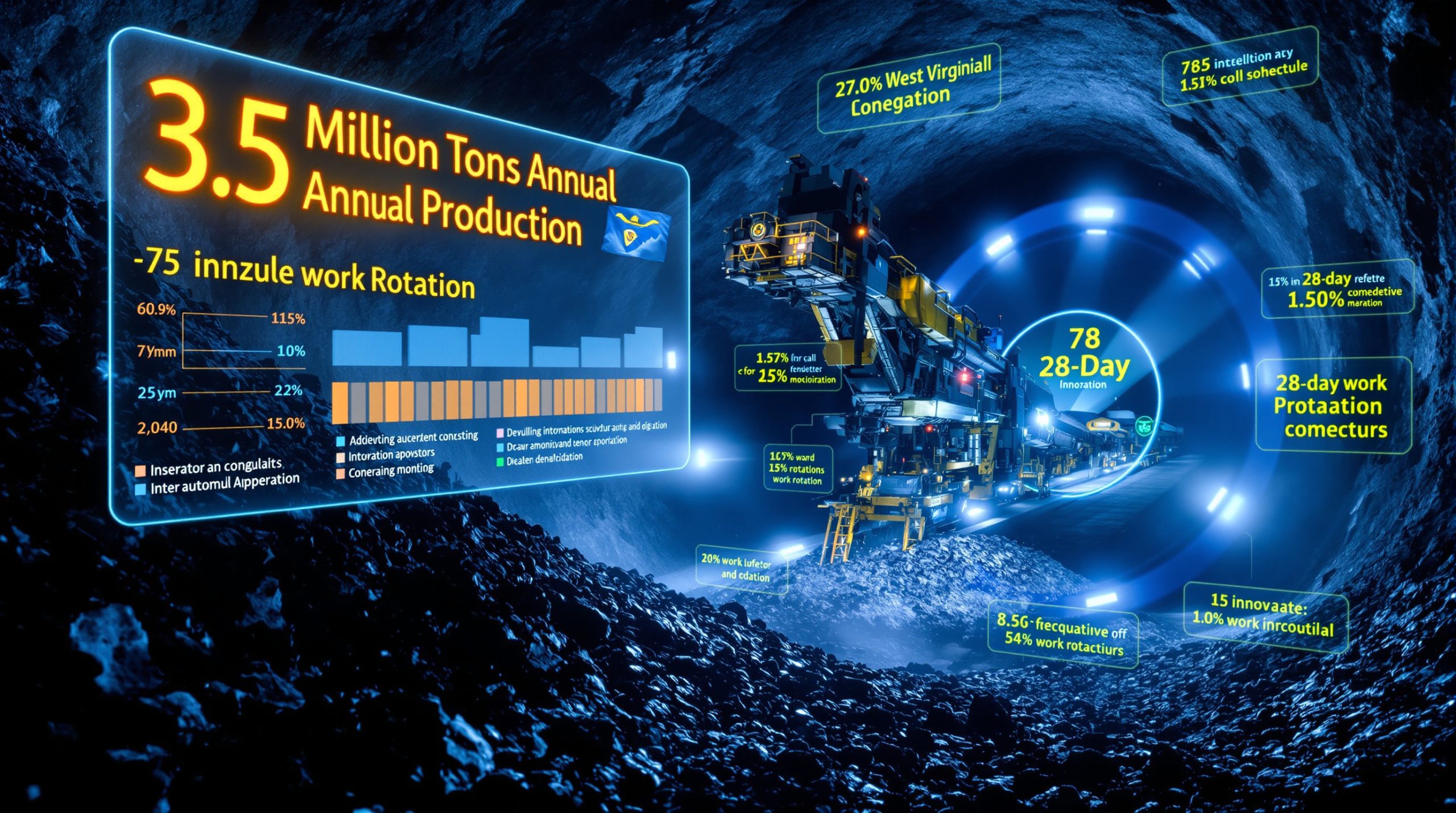Understanding the Failed Acquisition: Peabody Terminates Planned Deal with Anglo American
On August 21, 2025, Peabody Energy announced the termination of its planned acquisition of Anglo American's steelmaking coal assets, ending months of negotiations following a significant incident at the Moranbah North Mine in Australia. This decision has sent ripples through the global coal industry and raised questions about the future of both companies' strategic plans.
The Terminated Deal: Key Facts and Timeline
The acquisition, which was scheduled to close in April 2025, hit a major obstacle when an ignition event occurred at the Moranbah North Mine on March 31, 2025. This incident, which Peabody cited as a Material Adverse Change (MAC), ultimately led to the termination nearly five months later.
Jim Grech, Peabody's President and CEO, stated that "the two companies did not reach a revised agreement to cure the MAC that compensated Peabody for the material and long-term impacts of the MAC on the most significant mine in the planned acquisition."
As part of the fallout, Peabody also terminated the related agreement for the sale of the Dawson Mine to PT Bukit Makmur Mandiri Utama, further complicating the situation for all parties involved.
Financial Implications for Both Companies
The terminated deal has significant financial implications for both mining giants. Anglo American has been shouldering approximately US$45 million per month in holding costs at the Moranbah North Mine while production remains suspended. Without a clear timeline for resuming longwall production at forecasted volumes and costs, these expenses represent a substantial ongoing burden.
For Peabody, the termination means pivoting back to its existing portfolio strategy rather than expanding its footprint in the premium hard coking coal market through this acquisition.
Market analysts note that both companies' share prices have experienced volatility since the termination announcement, reflecting investor uncertainty about their respective paths forward.
The Moranbah North Mine Incident: Central to the Dispute
The March 31 ignition event at Moranbah North Mine sits at the heart of this corporate dispute. According to Peabody, the exact cause of the event "remains unknown, with no definitive timeline to resuming sustainable longwall production."
This uncertainty around one of the most valuable assets in the acquisition package ultimately became the breaking point in negotiations, with Peabody unwilling to proceed without substantial concessions regarding the mine's future performance.
What Led to the Termination?
The breakdown of this major acquisition offers important lessons for the mining industry about risk assessment, contract terms, and the challenges of managing large-scale transactions in a volatile sector.
The Material Adverse Change (MAC) Claim
Definition and Legal Significance of MAC Clauses
Material Adverse Change clauses are standard protections in acquisition agreements that allow buyers to walk away from transactions when unforeseen events significantly impact the value of the assets being purchased. In mining acquisitions, these clauses take on particular importance due to the inherent operational risks in the sector.
MAC clauses typically specify thresholds for what constitutes a "material" change, though these definitions often become the subject of dispute when invoked. The burden of proof generally falls on the party claiming the MAC to demonstrate that the change will have long-lasting effects on the business being acquired.
Peabody's Justification for Invoking the MAC Clause
Peabody justified its MAC claim based on the March 31 ignition event at Moranbah North Mine, which it characterized as having "material and long-term impacts" on what it described as "the most significant mine in the planned acquisition."
The company emphasized two key factors in its decision: the unknown cause of the event and the lack of a definitive timeline for resuming sustainable longwall production at the mine. These uncertainties, Peabody argued, fundamentally changed the value proposition of the acquisition.
The March 31, 2025 Ignition Event: Technical Details
While complete technical details of the incident remain limited in public disclosures, what is known is that the event was significant enough to halt production at one of Australia's premier coking coal mines. Underground coal mine ignition events typically involve the combustion of methane gas or coal dust, which can have serious safety implications and often require extensive investigations before operations can resume.
Industry experts note that such events frequently lead to enhanced safety protocols and potential operational modifications that can impact productivity and costs going forward.
Anglo American's Counterargument
Lack of Physical Damage Assessment
Anglo American's CEO, Duncan Wanblad, presented a markedly different assessment of the situation. He emphasized that their "view is supported by the lack of damage to the mine and equipment," suggesting that the physical infrastructure remained intact despite the incident.
This distinction is crucial, as physical damage would typically strengthen a MAC claim, while a temporary operational disruption without structural damage presents a more ambiguous case under standard MAC clause interpretations.
Progress Toward Mine Restart
Anglo American has highlighted the "substantial progress made with the regulator, our employees and the unions, and other stakeholders as part of the regulatory process towards a safe restart of the mine."
Wanblad specifically noted a recent milestone: "In fact, just in the last week we achieved a further important milestone, with our workforce signing off the risk assessment that underpins the restart strategy." This progress suggests the company believes the operational disruption is manageable and temporary rather than a fundamental change to the asset's value.
Regulatory Process Milestones Achieved
The regulatory approval process for resuming operations at mines after safety incidents involves multiple steps and stakeholder consultations. Anglo American's public statements indicate they have made substantial headway in this process, working through the necessary protocols with regulators, employees, and unions.
This progress would typically include development of enhanced safety measures, revised operational procedures, and potentially new monitoring systems to prevent similar incidents in the future.
Financial Impact of the Failed Deal
The collapse of this acquisition represents more than just a strategic setback—it has real financial implications for both companies, their shareholders, and potentially the broader coal market.
Original Acquisition Value and Structure
The acquisition would have transferred significant steelmaking coal assets from Anglo American to Peabody, reshaping both companies' portfolios and market positions. The deal structure involved not only the direct acquisition of Anglo American's steelmaking coal assets by Peabody but also a related transaction—the sale of the Dawson Mine to PT Bukit Makmur Mandiri Utama.
This complex arrangement was designed to optimize the value and strategic fit for all parties, making its collapse particularly disruptive to multiple business plans.
The Steelmaking Coal Assets Package
The package of assets central to this acquisition included several premium steelmaking coal operations, with the Moranbah North Mine described as the crown jewel. These high-quality metallurgical coal mines produce essential inputs for global steel production, commanding premium prices in international markets.
Industry analysts have noted that high-quality metallurgical coal assets are becoming increasingly strategic as steel producers seek to reduce their carbon footprints, as higher-grade coal can allow for more efficient and less emissions-intensive steelmaking.
Secondary Agreement: The Dawson Mine Sale
The termination of the main acquisition agreement triggered the collapse of the related deal to sell the Dawson Mine to PT Bukit Makmur Mandiri Utama. This cascading effect illustrates how complex corporate transactions often involve multiple interconnected agreements that can fall like dominoes when key components fail.
The Dawson Mine, located in Queensland, Australia, will now remain in its current ownership structure until alternative arrangements can be made, creating additional uncertainty for workers and local communities.
Monthly Holding Costs at Moranbah North
Anglo American continues to incur approximately US$45 million per month in holding costs at the idled Moranbah North Mine. These substantial costs include maintaining the mine in operational readiness, ongoing safety measures, employee retention, and regulatory compliance activities.
With no production revenue to offset these expenses, each month of delay represents a significant financial drain. Over the nearly five months since the incident, these holding costs have accumulated to approximately $225 million, highlighting the financial stakes of the dispute.
Market Reactions and Share Price Movements
The market response to the termination announcement has reflected the uncertainty created by this development. Both companies have experienced share price volatility as investors reassess their prospects in light of the failed deal.
For Anglo American, the ongoing costs of maintaining the idled mine and the need to find an alternative buyer or strategy for these assets present significant challenges. For Peabody, questions remain about how the company will pursue growth without this acquisition, though its existing portfolio continues to perform well in current market conditions.
What Happens Next for Both Companies?
With the acquisition terminated, both Peabody and Anglo American must now pivot to alternative strategies to create shareholder value and address the immediate challenges created by this situation.
Peabody's Strategic Pivot
Four-Pronged Value Creation Strategy
Following the termination announcement, Jim Grech outlined Peabody's intention "to execute a four-pronged strategy for value creation." While specific details of this strategy were not fully elaborated in the announcement, the company appears focused on leveraging its existing assets rather than pursuing alternative major acquisitions in the immediate term.
Industry analysts suggest this approach likely involves optimizing operational efficiency, strategic capital allocation, potential share repurchases, and targeted organic growth initiatives across its diverse global portfolio.
Focus on Centurion Mine and Existing Portfolio
Grech specifically highlighted Peabody's "new 25-year premium hard coking coal Centurion Mine" as a key asset in the company's portfolio. This long-life mine represents a significant organic growth opportunity for Peabody in the premium hard coking coal market, potentially offsetting some of the strategic objectives that were behind the Anglo American acquisition.
The company also emphasized its "low-cost seaborne thermal coal platform, and a leading US thermal coal position capitalizing on rising power generation demand," suggesting a balanced approach to both metallurgical and thermal coal markets going forward.
Seaborne Coal Market Position
Peabody's comments about "growing exposure to seaborne metallurgical coal" indicate the company remains committed to expanding its presence in the international coking coal market despite this setback. The seaborne coal trade represents a higher-margin opportunity compared to domestic coal markets, particularly for premium products like hard coking coal.
By emphasizing these aspects of its portfolio, Peabody is signaling to investors that it has alternative pathways to achieve its strategic objectives without the Anglo American assets.
Anglo American's Path Forward
Legal Response: Planned Arbitration Process
Anglo American's CEO made it clear that the company is "confident in our legal position and will shortly initiate an arbitration to seek damages for wrongful termination." This suggests a potentially lengthy legal dispute that could result in significant financial implications beyond the immediate deal collapse.
Wanblad noted that despite their strong legal position, the company had "invested significant effort and shown great flexibility over recent months to find a solution for Peabody, including proposing amended terms and technical options." This statement suggests Anglo American made substantial concessions in an attempt to salvage the deal before Peabody ultimately walked away.
Moranbah North Restart Timeline
While no specific timeline has been provided for the restart of Moranbah North, Anglo American has emphasized the progress made toward that goal, including the recent workforce sign-off on the risk assessment underpinning the restart strategy.
Industry experts suggest that mines experiencing similar incidents typically face reopening timelines of 6-12 months, depending on the severity of the event, regulatory requirements, and necessary operational modifications.
Alternative Sales Process for the Coal Assets
Duncan Wanblad expressed confidence that Anglo American "will successfully conclude an alternative sales process for value in due course," noting that the company "held a very competitive process to sell this high-quality parcel of steelmaking coal assets in 2024."
He also revealed that "the unsolicited inbound interest expressed to us in recent months is testament to the strategic value of these assets and the attractive long-term market fundamentals." This suggests that despite the setback with Peabody, Anglo American has other potential buyers interested in acquiring these valuable assets.
Legal Implications of the Dispute
The termination has set the stage for what could be a significant legal battle between two major mining companies, with important implications for how Material Adverse Change clauses are interpreted in the industry.
Potential Arbitration Outcomes
Precedents in Mining Acquisition Disputes
While each arbitration case is unique, previous disputes over terminated mining acquisitions have established some precedents that may influence this case. The interpretation of MAC clauses typically hinges on whether the adverse event has a long-term, material impact on the value of the assets being acquired.
Courts and arbitrators generally set a high bar for buyers seeking to terminate transactions based on MAC clauses, requiring substantial evidence that the change fundamentally alters the economic basis of the deal rather than representing a temporary setback.
Damages Sought for Alleged Wrongful Termination
Anglo American has indicated it will seek damages for what it considers "wrongful termination" of the agreement. These damages could potentially include:
- Compensation for the holding costs incurred during the extended negotiation period
- The difference in value between the Peabody deal and any eventual alternative transaction
- Legal costs and other expenses related to the dispute
- Potential reputational damages affecting future asset sales
Timeline for Resolution
Arbitration processes in complex mining disputes typically take 12-24 months to reach resolution, though the specific timeline will depend on the arbitration forum selected, the complexity of the issues, and the willingness of the parties to pursue settlement options along the way.
During this period, both companies will need to manage the uncertainty created by the pending legal process while simultaneously pursuing their alternative business strategies.
MAC Clause Interpretation Challenges
Industry Standards for "Material" Events
The mining industry faces unique challenges in defining what constitutes a "material" adverse change due to the inherent operational risks and volatility in commodity markets. Standard practice typically requires that MAC events:
- Have a significant impact on the overall value of the transaction
- Create effects that are durable rather than temporary
- Could not have been reasonably anticipated at the time the agreement was signed
The arbitration process will likely focus intensely on whether the Moranbah North incident meets these thresholds, particularly given Anglo American's claims about the lack of physical damage and progress toward restart.
Burden of Proof in MAC Claims
In most jurisdictions, the burden of proof in MAC clause disputes falls on the party invoking the clause—in this case, Peabody. The company will need to demonstrate that the incident's impacts are sufficiently severe and long-lasting to justify termination under the specific language of their agreement.
Anglo American's public statements suggest they believe Peabody cannot meet this burden, setting the stage for a contentious legal battle over the interpretation of the facts and the contract language.
The Moranbah North Mine: At the Center of the Dispute
Understanding the Moranbah North Mine's significance provides essential context for appreciating why this single asset became the breaking point for the entire acquisition.
Mine Production Significance
Previous Output Levels and Projections
Prior to the incident, Moranbah North was targeted to produce approximately 5.3 million tonnes of saleable production in 2025, representing a substantial portion of the acquisition package's expected output. This high-volume production capability made it a particularly valuable component of the deal.
The mine has historically been one of Australia's premier hard coking coal operations, consistently producing high-quality coal suited for premium steel manufacturing applications.
Quality and Market Position of Its Coal
Moranbah North produces premium hard coking coal, which commands top-tier pricing in international markets due to its superior qualities for steelmaking. These include:
- High carbon content
- Low impurity levels
- Strong coking properties
- Consistent quality specifications
These characteristics allow steelmakers to produce higher-quality steel with lower emissions intensity, making such coal increasingly valuable as environmental standards tighten globally.
Strategic Importance in the Portfolio
Peabody specifically referred to Moranbah North as "the most significant mine in the planned acquisition," highlighting its central role in the strategic rationale for the transaction. The mine's combination of production volume, coal quality, and operational history made it a cornerstone asset that would have substantially enhanced Peabody's metallurgical coal portfolio.
This strategic importance explains why uncertainty around the mine's restart timeline became such a critical sticking point in negotiations.
Current Status and Recovery Progress
Risk Assessment Completion
Anglo American recently achieved what CEO Duncan Wanblad described as "a further important milestone, with our workforce signing off the risk assessment that underpins the restart strategy." This development represents a significant step in the regulatory process required to resume operations.
Risk assessments for mine restarts typically involve comprehensive evaluation of:
- Root causes of the incident
- Potential hazards throughout the operation
- Control measures to mitigate identified risks
- Monitoring systems to provide early warning of similar conditions
- Emergency response procedures
Workforce and Union Engagement
The involvement of the workforce in signing off on the risk assessment indicates progress in building consensus among key stakeholders. In Australian mining operations, union and workforce support is often critical to successful mine planning processes following safety incidents.
This engagement suggests Anglo American has been making progress in addressing concerns and building confidence in the restart plan among those who will be directly involved in implementing it.
Technical Challenges in Resuming Operations
While Anglo American has emphasized the lack of physical damage to the mine and equipment, resuming operations after an ignition event still presents significant technical challenges. These typically include:
- Enhanced gas monitoring systems
- Revised ventilation plans
- Modified operational procedures
- Additional safety equipment
- Potential changes to mining methods or sequences
These modifications can impact productivity and costs even after operations resume, which likely contributed to Peabody's concerns about the long-term value implications of the incident.
Industry Impact and Market Analysis
The termination of this major acquisition has implications beyond the two companies directly involved, potentially affecting market dynamics and future industry transactions.
Steelmaking Coal Market Dynamics
Supply-Demand Balance After the Failed Deal
The failed acquisition maintains the status quo in terms of asset ownership but creates uncertainty about future production levels at Moranbah North. This uncertainty comes at a time when steelmaking coal markets are already navigating complex supply and demand dynamics.
Market observers note that any prolonged production outage at Moranbah North could tighten supply in the premium hard coking coal segment, potentially supporting prices if demand remains stable.
Price Implications for Premium Hard Coking Coal
Premium hard coking coal prices have historically shown sensitivity to supply disruptions, particularly from Australian producers who dominate the high-quality segment of the market. The ongoing production uncertainty at Moranbah North could contribute to price volatility in this segment.
However, broader market factors including Chinese import policies, global steel production levels, and competing supply from other regions will also play significant roles in determining price trajectories.
Competitive Landscape Shifts
The termination preserves the current competitive landscape rather than consolidating assets under Peabody's control as originally planned. This maintains the existing diversity of suppliers in the premium hard coking coal market, which some steel producers may view positively from a procurement perspective.
For competitors in the space, the failed deal may present both challenges and opportunities as they navigate the ongoing uncertainty surrounding these assets.
Future of Coal Asset Transactions
Valuation Challenges in Volatile Markets
This dispute highlights the difficulties in valuing coal assets in today's volatile market environment. Factors contributing to these valuation challenges include:
- Unpredictable operational disruptions like the Moranbah North incident
- Fluctuating commodity price environments
- Evolving regulatory requirements and carbon policies
- Changing investor expectations regarding fossil fuel assets
Future transactions may incorporate more robust contingency mechanisms to address these uncertainties, potentially including more detailed MAC clause definitions and specific provisions for operational incidents.
Risk Assessment in Future Acquisitions
The Peabody-Anglo American dispute may lead to more comprehensive risk assessment processes during the due diligence phase of future acquisitions. Potential buyers may place greater emphasis on:
- Historical safety performance and incident records
- Technical evaluations of operational risks
- Contingency planning for potential disruptions
- More conservative production and financial projections
These enhanced risk assessments could extend transaction timelines but may ultimately result in more resilient deal structures.
Environmental and Regulatory Considerations
Beyond the operational issues highlighted in this case, coal asset transactions increasingly face scrutiny regarding environmental and regulatory factors. Future deals will likely incorporate more detailed considerations of:
- Carbon transition risks
- Evolving environmental regulations
- Rehabilitation and closure obligations
- Community and stakeholder expectations
These factors add additional layers of complexity to coal asset valuations and transaction structures, potentially influencing how companies approach future acquisitions in this space.
FAQ: Peabody-Anglo American Deal Termination
Why did Peabody terminate the acquisition?
Peabody cited a Material Adverse Change (MAC) stemming from the March 31, 2025 ignition event at the Moranbah North Mine. The company emphasized two key factors: the unknown cause of the event and the lack of a definitive timeline for resuming sustainable longwall production at what it described as "the most significant mine in the planned acquisition."
Despite negotiations, the companies failed to reach an agreement that would "compensate Peabody for the material and long-term impacts" of the incident.
What does Anglo American plan to do with these assets now?
Anglo American has indicated it will pursue an alternative sales process for its steelmaking coal assets. CEO Duncan Wanblad expressed confidence that the company "will successfully conclude an alternative sales process for value in due course," noting they have received "unsolicited inbound interest" that demonstrates "the strategic value of these assets and the attractive long-term market fundamentals."
In the meantime, Anglo American continues to "focus on the safe restart of Moranbah North and in delivering value from the entirety of our SMC portfolio."
Could this dispute have been avoided?
According to Anglo American's CEO, the company "invested significant effort and shown great flexibility over recent months to find a solution for Peabody, including proposing amended terms and technical options." This suggests that Anglo American made substantial attempts to accommodate Peabody's concerns and salvage the deal.
However, the fundamental disagreement over the significance and long-term implications of the Moranbah North incident created a gap that ultimately proved unbridgeable. The different assessments of the situation by the two companies highlight the challenges in aligning buyer and seller perspectives when unexpected events occur during transaction processes.
What are the implications for shareholders?
For Anglo American shareholders, the immediate implications include continued exposure to:
- Ongoing holding costs of approximately US$45 million per month at Moranbah North
- Uncertainty about the timeline for resuming production at the mine
- Potential value differences between the terminated Peabody deal and any alternative transaction
- Legal costs and management attention devoted to the arbitration process
For Peabody shareholders, the implications include:
- Reduced near-term growth in the premium hard coking coal segment
- Greater reliance on organic growth through assets like the Centurion Mine
- Potential legal liabilities if Anglo American's arbitration claim succeeds
- Opportunities to pursue alternative strategic initiatives without the integration challenges of a major acquisition
Both sets of shareholders face uncertainty regarding the ultimate resolution of the legal dispute and its financial implications.
Lessons from the Failed Acquisition
Risk Management in Major Mining Transactions
This case highlights the importance of robust risk management frameworks in mining acquisitions. Future transactions may benefit from:
- More detailed contingency planning for operational disruptions
- Clearer definitions of what constitutes a "material" adverse change
- Mechanisms for independent technical assessment of incidents
- Structured processes for resolving disputes before they reach termination
These enhancements could help bridge the gap between buyer and seller perspectives when unexpected events occur during transaction processes.
Importance of Contingency Planning
The Peabody-Anglo American dispute demonstrates how quickly unforeseen events can derail even well-structured transactions. Effective contingency planning requires:
- Realistic assessment of operational risks
- Clear communication protocols between parties
- Defined procedures for evaluating incidents
- Flexible frameworks for adjusting terms when conditions change
Companies engaging in major mining transactions may increasingly incorporate such contingency planning into their deal structures to better navigate unexpected challenges.
Future Outlook for Both Companies
Both Peabody and Anglo American have demonstrated resilience in navigating this challenging situation and have outlined clear paths forward despite the deal's collapse.
Peabody appears focused on executing its "four-pronged strategy for value creation" with emphasis on its existing portfolio, particularly its new Centurion Mine producing premium hard coking coal.
Anglo American is pursuing dual tracks: working toward the safe restart of Moranbah North while simultaneously exploring alternative sales processes for its steelmaking coal assets, supported by apparent market interest in these high-quality operations.
The legal dispute between the companies adds a layer of uncertainty to their respective outlooks, but both appear positioned to move forward with their core operations while this process unfolds. As the mining industry evolution trends continue to shape the sector, companies must adapt their strategic approaches to navigate both operational challenges and potential hostile takeover strategies that may emerge in this competitive landscape.
For investors watching this situation closely, this case provides valuable class action lawsuit insights into how corporate governance and operational risk management can impact investment opportunities in the mining sector.
Ready to Identify the Next Major Mineral Discovery?
Stay ahead of the market with Discovery Alert's proprietary Discovery IQ model, which instantly analyses and notifies you of significant ASX mineral discoveries as they are announced. Explore historic examples of exceptional returns on our dedicated discoveries page and position yourself for investment success.




